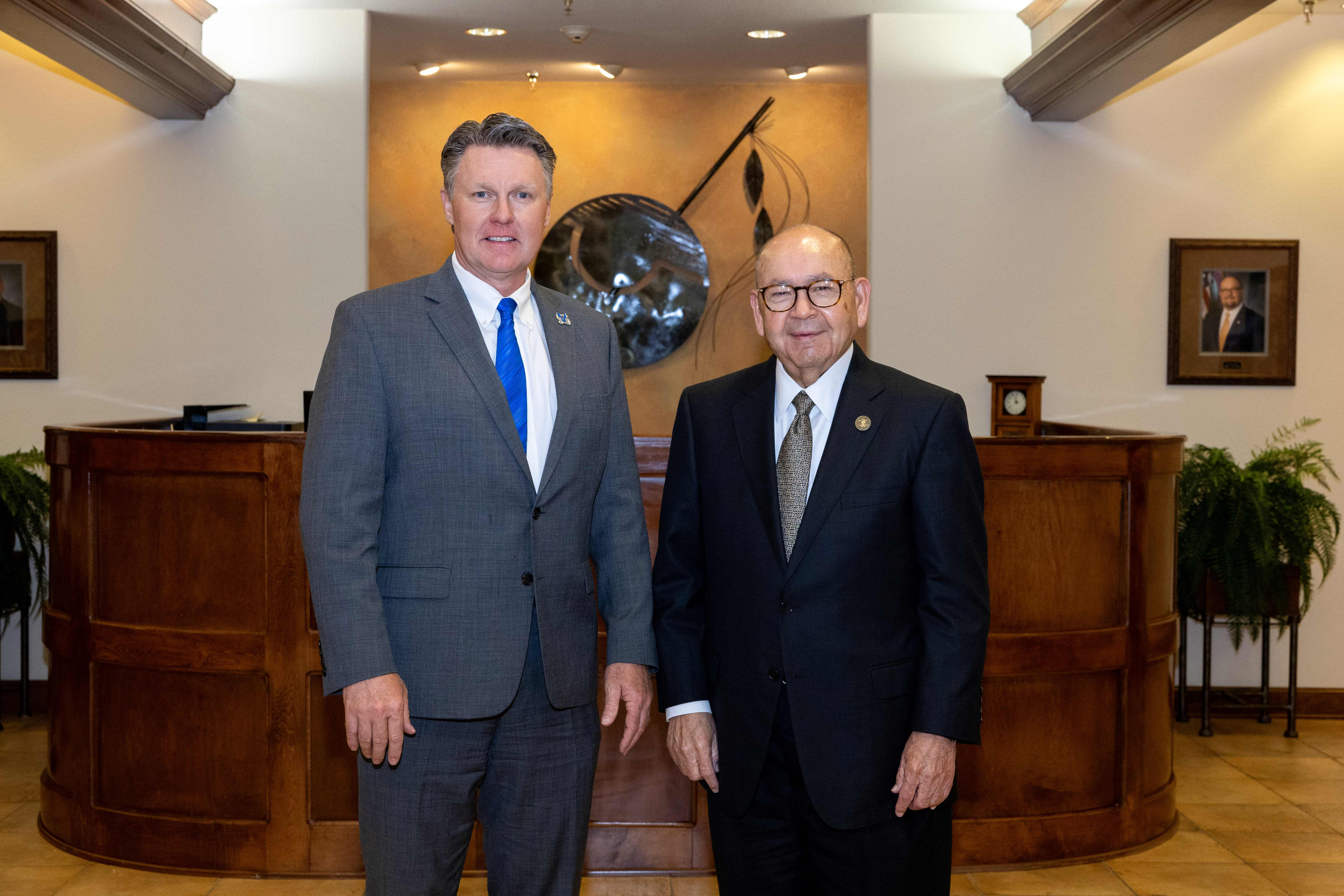
- Details
- By Chickasaw Nation Media
Chickasaw Nation Governor Bill Anoatubby and Murray State College President Dr. Tim Faltyn recently acknowledged their respective institutions’ partnership in a U.S. Department of Agriculture (USDA) Climate-Smart grant, which focuses on enhancing climate-smart agriculture practices.
“We are grateful for Governor Anoatubby and the opportunity to collaborate on the Climate-Smart grant to expand our agriculture program, and serve local farmers and special populations,” Faltyn said. “The program will strengthen Murray State’s academic programs and partnership with the Chickasaw Nation.”
The USDA partnership with the Chickasaw Nation and Murray State College (MSC), Tishomingo, Oklahoma, allows the Chickasaw Nation and other Oklahoma pecan producing landowners to receive incentive payment for market pecans after they implement soil health and conservation best management practices on their lands.
The USDA Climate-Smart grant is a five-year, $5 million grant from November 2023 through November 2028. It is expected that a minimum of 150 farmers, both pecan and specialty crop growers, may benefit.
As an incentive to offset low commodity prices, $2.4 million will go back to pecan farmers who will be compensated for performing climate-smart practices, which help both local ecology and watershed health.
A total of $475,000 will go toward marketing climate-smart produce to ensure farmers are compensated fairly, and consumers understand the positive impacts farmers are making in local watersheds and their communities.
Additionally, the Chickasaw Nation’s Bedré Chocolate company will now have the opportunity to source pecans grown within the Chickasaw Nation.
Murray State College was awarded approximately $1.9 million.
According to MSC’s website, the resulting new program is designed to provide education to underserved students and local farmers about agriculture practices on a small scale.
MSC will build a curriculum to train underserved students about the importance of agriculture, using clean practices to preserve the environment, lessen herbicide and pesticide use, as well as using sustainable practices in specialty crops like native pecans and produce sold at local farmers markets.
Forty-five MSC students will receive $5,000 scholarships over the five-year period and benefit from participating in ranching, agriculture technology and horticulture associate programs.
A climate-smart verification class will train students to be able to identify climate-smart practices on participating farms. This will give them experience to find jobs locally or nationally later, as USDA plans to expand this program.
Funds for the grant allocation to MSC will aid in hiring a project coordinator, full-time faculty and purchase needed equipment and supplies, as well as provide student scholarships.
More Stories Like This
Trump signs law that revokes some limits on drilling in Alaska’s National Petroleum ReserveSouthern Sierra Miwuk Nation Gets 900-Acres ofLand Back
Chilkat Indian Village Tells New Palmer Mine Owners They Are “Not Welcome” in Chilkat Valley
Tribes, Coastal Group Ask Army Corps to Revoke Permit for Texas Export Terminal
Michigan Tribes Tell Supreme Court: Don’t Bail Out Enbridge
Help us defend tribal sovereignty.
At Native News Online, our mission is rooted in telling the stories that strengthen sovereignty and uplift Indigenous voices — not just at year’s end, but every single day.
Because of your generosity last year, we were able to keep our reporters on the ground in tribal communities, at national gatherings and in the halls of Congress — covering the issues that matter most to Indian Country: sovereignty, culture, education, health and economic opportunity.
That support sustained us through a tough year in 2025. Now, as we look to the year ahead, we need your help right now to ensure warrior journalism remains strong — reporting that defends tribal sovereignty, amplifies Native truth, and holds power accountable.
 The stakes couldn't be higher. Your support keeps Native voices heard, Native stories told and Native sovereignty defended.
The stakes couldn't be higher. Your support keeps Native voices heard, Native stories told and Native sovereignty defended.
Stand with Warrior Journalism today.
Levi Rickert (Potawatomi), Editor & Publisher

